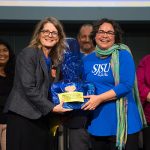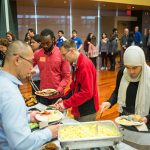- Provost Andy Feinstein and the Academic Affairs Leadership team hosted an appreciation breakfast to say thanks to the 500 staff members who support faculty and students in the division. (Photo: James Tensuan, ’15 Journalism)
- Provost Andy Feinstein laughs with staff members during the breakfast. (Photo: James Tensuan, ’15 Journalism)
- Dean of the Charles W. Davidson College of Engineering Sheryl Ehrman poses for a photo with basket winner Lisa Francesca at the breakfast. (Photo: James Tensuan, ’15 Journalism)
- Guests help themselves to a buffet breakfast during the event. (Photo: James Tensuan, ’15 Journalism)
- Grupo Folklorico Luna y Sol de San Jose State provided entertainment at the breakfast. (Photo: James Tensuan, ’15 Journalism)
- Guests enjoy the entertainment during the breakfast. (Photo: James Tensuan, ’15 Journalism)
On Nov. 9, the Academic Affairs Leadership Team showed their gratitude for the nearly 500 dedicated staff members in the division who support students, faculty and administrators at the annual Academic Affairs Division Staff Appreciation Breakfast.
“I want to personally express my gratitude for your year-round commitment to supporting our division,” said Provost and Senior Vice President for Academic Affairs Andy Feinstein, noting that some staff members provide positive touchpoints for students while others have important behind-the-scenes roles. “All of you have an important hand in the success of our students and the university on a daily basis. You are integral to the quality of life on our campus and I thank each and every one of you.”
At the breakfast, each of the college deans and unit heads took a turn sharing a personal thank you to their employees. The festivities included drawings for gift baskets – one per college or unit – as well as other prizes.
This year, staff members were asked to share their own “shouts outs” to coworkers for doing exemplary work. The dozens of comments exemplified the characteristics and actions that make Spartan staff members so great: they greet students with grace and enthusiasm; they go the extra mile; they are patient and funny; they are team players.
Entertainment this year again included a photo booth where coworkers took silly snapshots with props (photos can be viewed online) and Grupo Folklorico Luna y Sol de San Jose State, a group of SJSU students who perform traditional Mexican dances. See more photos from the event online.






